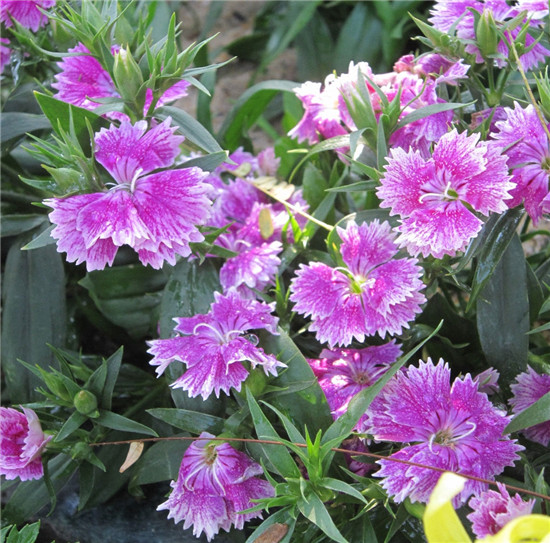The characteristics of Caryophyllum chinense
Dianthus chinensis is a perennial herb, often used as an ornamental plant. Dianthus chinensis also has certain medicinal value. Let's take a look at the characteristics of Carnation Grass!

Carnation is a perennial herb, rare annual. Roots are sometimes lignified. Stems tufted, terete or ribbed, articulated, nodes dilated. Leaves grasslike, opposite, leaf blade linear or lanceolate, often pale, veins parallel, margin scabrous, base slightly connate.
Flowers red, pink, purple, or white, solitary or in cymes, sometimes clustered into capitate, surrounded by involucral bracts; calyx cylindric, 5-toothed, excoriaceous, veined 7, 9, or 11, basal adnate bracts 1-4 pairs; petals 5, long clawed, limb margins dentate or tunnel-lobed, sparsely entire; stamens 10; styles 2, ovary 1-loculed, with numerous ovules, with long ovary stalks.
Capsule cylindric or oblong, sparsely ovoid, apically 4-toothed or valved; seeds numerous, rounded or peltate; embryo straight, endosperm often lateral. The plant height is 15-25cm. Stems erect, nodes dilated, numerous. Branches. Leaves opposite, linear-lanceolate, gray-green, base clasping. Flowers solitary or inflorescences, petals 5 or double, apex shallowly dentate, flower diameter about 3 cm, pink, purple, base white and other colors. Capsule, seeds compressed, black. Dianthus species and varieties are many, often for one or two years of cultivation of the species are stone lotus group Dianthus, must be bracts Dianthus (also known as American Dianthus), sea Dianthus and so on.

Growth habits like sunshine, high dryness, ventilation, cool environment, cold radiation suitable for good drainage, fertile and loose and alkaline soil. The flowering period is usually May, and the fruit ripening period is June to October. The propagation method is mainly to sow God, mostly in autumn in the middle and late August, and the two seedlings grow strong and bloom vigorously. Spring sowing is generally from late March to early April. 7-10 It sprouts in the sky, but its growth is not as good as that of autumn seedlings.
What are the effects of carnation grass? Carnation grass can be whole grass or root medicine, medicinal value is also very high, next I answer its efficacy for everyone.
Nature taste: bitter, cold. Return to the heart, small intestine meridian.
Chemical composition: The whole grass contains saponin and volatile oil. The oil is mainly eugenol, phenethyl alcohol, benzyl benzoate, benzyl salicylate and methyl salicylate.

Indications: Dianthus chinensis has the effects of clearing heat, diuresis, activating blood circulation and dredging channels. it can be use for treating urethritis, cystitis, nephritis, hypertension, amenorrhea, irregular menstruation, pharyngitis, diarrhea, edema, joint disorder, snake bite, furuncle, carbuncle, and intestinal tract irritation. "Materia Medica Preparation Essentials" said: "Lower heart fire, benefit small intestine, expel bladder evil heat, for the treatment of stranguria to medicine."
Dianthus chinensis has low plant type, bamboo like stem, green leaves, natural flowering period from May to September, from late spring to mid-autumn, greenhouse potted flowers can bloom all the year round. Flower terminal unripe branch end, unripe or pair, also have show panicle shape cyme, spend diameter not big, only 2 to 3 centimeters, but flower luxuriant, rise and fall, ornamental period is longer. Color has white, pink, red, pink, red, purple, lavender, yellow, blue, colorful, changing end.

The above is what I summarized for you the characteristics of Dianthus, Dianthus characteristics of all content, I hope this article can help you. Please continue to pay attention to us.
- Prev

What is the implication of how to raise flowers in potted carnations?
What is the implication of how to raise flowers in potted carnations?
- Next

When is the flowering period of Paeonia lactiflora? the flowering season of peony flowers
When is the flowering period of Paeonia lactiflora? the flowering season of peony flowers
Related
- Wuhan Hospital Iron Tree Blooming Result Was Instantly Frightened by the Gardener Master
- Which variety of camellia is the most fragrant and best? Which one do you like best?
- What is the small blue coat, the breeding methods and matters needing attention of the succulent plant
- Dormancy time and maintenance management of succulent plants during dormancy
- Minas succulent how to raise, Minas succulent plant pictures
- What are the varieties of winter succulent plants
- How to raise succulent plants in twelve rolls? let's take a look at some experience of breeding twelve rolls.
- Attention should be paid to water control for succulent plants during dormant period (winter and summer)
- Watering experience of twelve rolls of succulent plants
- Techniques for fertilizing succulent plants. An article will let you know how to fertilize succulent plants.

